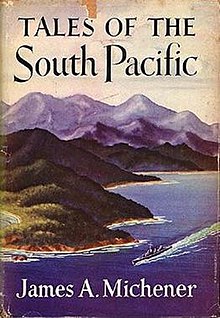Tales of the South Pacific

First edition cover
|
|
| Author | James A. Michener |
|---|---|
| Country | United States |
| Language | English |
| Genre | Interrelated short stories |
| Publisher | Macmillan, New York |
|
Publication date
|
January 28, 1947 |
Tales of the South Pacific is a Pulitzer Prize-winning collection of sequentially related short stories by James A. Michener about the Pacific campaign in World War II. The stories are based on observations and anecdotes he collected while stationed as a lieutenant commander in the US Navy on the island of Espiritu Santo in the New Hebrides Islands (now known as Vanuatu).
Written in 1946 and published in 1947, the book was adapted in 1949 as the Broadway musical South Pacific and subsequently as two films, released in 1958 and 2001.
The stories take place in the environs of the Coral Sea and the Solomon Islands. Michener as narrator gives a first-person voice to several of the stories as an unnamed "Commander", performing duties similar to those he performed himself during World War II.
The stories are interconnected by recurring characters and several loose plot lines. One plot line in particular is the preparation for and execution of a fictitious amphibious invasion, code-named "Alligator". The focus of the stories is, however, the interactions between Americans and a variety of colonial, immigrant, and indigenous characters.
The chronology of the stories begins with the building of an airfield on Norfolk Island before the Battle of the Coral Sea, in 1942, and goes through the early 1944 invasion of one of Michener's fictional islands. Although the stories are primarily about the U.S. Navy, most of the action is shore-based, and none concerns ships larger than an LCI.
The highly successful musical play South Pacific by Rodgers and Hammerstein, which opened on Broadway on April 7, 1949, was based on the stories in Tales of the South Pacific. In particular, the stories used were "Fo' Dolla'", about Bloody Mary, Liat, and Lieutenant Joe Cable; and "Our Heroine", about Nellie Forbush and Emile de Becque. Characters from other stories, such as Bill Harbison, Bus Adams, and Luther Billis, play minor or supporting roles.
...
Wikipedia
